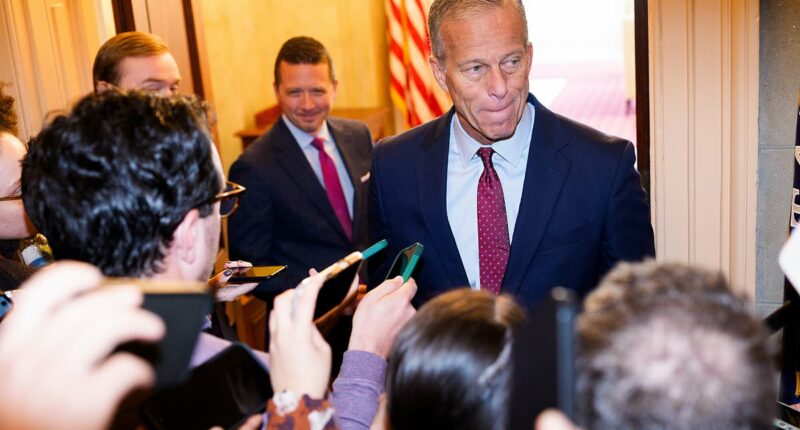Share this @internewscast.com
On Capitol Hill, legislators are convening for an unusual Sunday meeting this afternoon, attempting once more to bring the federal government back into operation as the shutdown reaches its 40th day.
Republicans are cautiously hopeful that today’s negotiations could signify a significant move toward resolving the ongoing government closure. Nonetheless, several critical issues remain to be addressed.
Despite their control of Congress, Republicans possess only 53 Senate seats, leaving them short of the 60 votes necessary to approve a funding bill.
Both Senate Republicans and some Democrats are increasingly concerned about the growing repercussions of the shutdown. They are keen to restore government functionality before the situation deteriorates further.
Their worries encompass a range of issues, from delayed flights and federal employees missing paychecks to economic pressures and the suspension of food aid for at-risk families.
This sense of urgency has spurred a renewed effort to reach an agreement swiftly. Senate Republicans plan to meet behind closed doors at 12:30 p.m. ET, followed by the Senate’s official session at 1:30 p.m. ET.
GOP lawmakers are working toward holding a procedural vote soon on a temporary funding measure, though the bill’s text has yet to be finalized. The proposal is expected to keep the government funded through January, while providing full-year funding for Congress, the Department of Agriculture, and the Department of Veterans Affairs, including military construction projects, through the next fiscal year.
However, passing the measure needs 60 Senate votes, meaning Republican support from Democrats is crucial. Although GOP leaders believe they’re close, health care subsidy issues under the Affordable Care Act remain unresolved.

Senate Majority Leader John Thune (R-SD) speaks to members of the press as he heads to his office in the Capitol Building on November 8, 2025 in Washington, DC

Senate Minority Leader Chuck Schumer (D-NY) departs a Democratic luncheon at the U.S. Capitol on November 6, 2025 in Washington, DC

House Minority Leader Hakeem Jeffries (D-NY) speaks during a news conference at the U.S. Capitol on November 6, 2025 in Washington, DC
House Minority Leader Hakeem Jeffries told NBC’s Kristen Welker on Meet The Press Sunday when asked if he ruled out supporting a potential funding bill that would ‘include a promise to vote on Obamacare subsidies’ that he doesn’t ‘think that the House Democratic Caucus is prepared to support a promise, a wink and a prayer, from folks who have been devastating the health care of the American people for years.’
Senate Democrats are hesitant to back the plan without movement on health care provisions, the same issue that led them to oppose a stopgap funding bill in September.
Still, once senators reach a consensus, the legislative process could advance swiftly, signaling that a breakthrough, while uncertain, remains possible.
Republicans have supported a short-term measure to fund the government at generally current levels, previously approved under the Biden administration, through November 21, but Democrats have blocked it, insisting that the measure does not address their concerns regarding healthcare.
Senate Majority Leader John Thune has given Senate Democrats 14 chances to vote to open the government.
Public frustration with the prolonged shutdown is intensifying, increasing pressure on both parties to reach an agreement.
Air traffic has been hit hard, with Transportation Secretary Sean Duffy warning on CNN that staffing shortages are worsening, potentially reducing air travel to a trickle.

U.S. Transportation Secretary Sean Duffy holds a press conference on the impact of the government shutdown on air travel, at LaGuardia Airport

People walk through Hartsfield-Jackson Atlanta International Airport in Atlanta, Georgia
Due to the shutdown, 42 million Americans missed their Supplemental Nutrition Assistance Program (SNAP) benefits at the beginning of November.
Other states, such as Hawaii, have since been able to pay the money to recipients in their states by tapping into a federal block grant program known as the Temporary Assistance for Needy Families, or TANF.
Amid negotiations, a high-ranking Democrat acknowledged the political leverage hardships caused by the shutdown create for her party.
Massachusetts Congresswoman Katherine Clark, Minority Whip of the United States House of Representatives, admitted that she views families struggling during the shutdown as ‘leverage’ for her party to use in political games.
‘Shutdowns are terrible. And of course, there will be families that are going to suffer. We take that responsibility very seriously, but it is one of the few leverage times we have,’ Clark said.
The House of Representatives has been in recess since Republicans passed their funding bill, leaving the resolution of the shutdown in the hands of their Senate colleagues.









